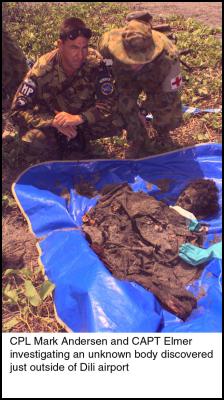NZ Military Police Investigate East Timor Graves
New Zealand Defence Force
by Major Bede Fahey, PRO NZFOREM Timor
Warning: Graphic Image may offend The extent of the savagery in East Timor is now becoming more obvious as INTERFET troops gain a widespread presence throughout the country and more of the militia handiwork comes to light. Reports of hastily buried bodies are an almost daily occurrence as the effect of weather and wild dogs make these often remote grave sites more distinguishable.

Image courtesy of New
Zealand Defence
Investigation teams have been formed to follow up these reports and attempt to build a picture of what happened, who these people were and who may have been responsible for what in many cases have been incredibly brutal, calculated slayings. Three New Zealand Army military policemen are currently working on these teams as part of INTERFET’s Special Investigation Section. They are working under the UN mandate which gives them authority to investigate crimes against humanity in East Timor and collect evidence which may later be used to prosecute those suspected of these crimes.
The job of these teams is not a pleasant one. Along with medical staff and representatives from the International Committee of the Red Cross (ICRC) they must firstly locate these sites and then establish if indeed there are bodies present. If bodies are located, an exhumation is carried out and the remains examined by a military doctor who will try and establish a cause of death. This has often proved difficult due to the advanced state of decomposition but with some it has been only too starkly obvious. Fractured skulls, bullet holes and severed limbs give a chilling indication of the last minutes of these peoples lives. Once all evidence has been collected the remains are removed to a local cemetery for reburial along with a small service conducted by a military chaplain.
For the New Zealand military investigators, this job is a challenging and ongoing one. Corporal Mark Anderson said, “None of us have had much previous experience working on homicides but we’re all trained investigators and we’ll work through these inquiries to the very best of our ability. If we can bring just one person to justice it will make this nine months worthwhile.”
The scene as yet
another body is brought in for reburial in the outskirts of
Dili is moving. A group of local people quickly gather
around and join the chaplain in prayers for a person they
will never know, while young girls toss flowers into the
grave. As Corporal Anderson commented, “If any pleasure can
be taken out of this, it’s to see these people moved from
some unknown gravesite and buried with some
dignity.”


 Gordon Campbell: On The History Of Doo Wop Music
Gordon Campbell: On The History Of Doo Wop Music Wellington City Council: 'I Am Focused On Continuing The Momentum' – Mayor Tory Whanau
Wellington City Council: 'I Am Focused On Continuing The Momentum' – Mayor Tory Whanau Love Food Hate Waste: From Overbuying To Overcooking - Food Waste Challenges Impacting Smaller Households
Love Food Hate Waste: From Overbuying To Overcooking - Food Waste Challenges Impacting Smaller Households NZ Government: Strong Biosecurity More Important Than Ever
NZ Government: Strong Biosecurity More Important Than Ever Environmental Defence Society: Regulatory Standards Bill Should Be Stopped In Its Tracks
Environmental Defence Society: Regulatory Standards Bill Should Be Stopped In Its Tracks NZ Police: A Minute's Silence And Livestream Of Funeral Service For Senior Sergeant Lyn Fleming
NZ Police: A Minute's Silence And Livestream Of Funeral Service For Senior Sergeant Lyn Fleming Socialist Equality Group: Foreign Interference Bill Prepares New Attacks On Democratic Rights
Socialist Equality Group: Foreign Interference Bill Prepares New Attacks On Democratic Rights


